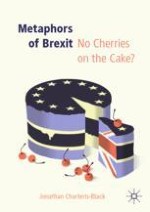2019 | OriginalPaper | Buchkapitel
9. Animals: Moral Intuition and Moral Reasoning
verfasst von : Jonathan Charteris-Black
Erschienen in: Metaphors of Brexit
Aktivieren Sie unsere intelligente Suche, um passende Fachinhalte oder Patente zu finden.
Wählen Sie Textabschnitte aus um mit Künstlicher Intelligenz passenden Patente zu finden. powered by
Markieren Sie Textabschnitte, um KI-gestützt weitere passende Inhalte zu finden. powered by
